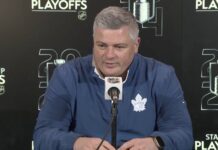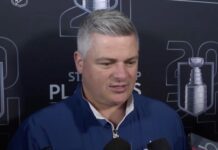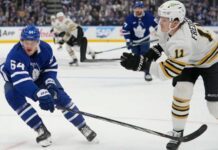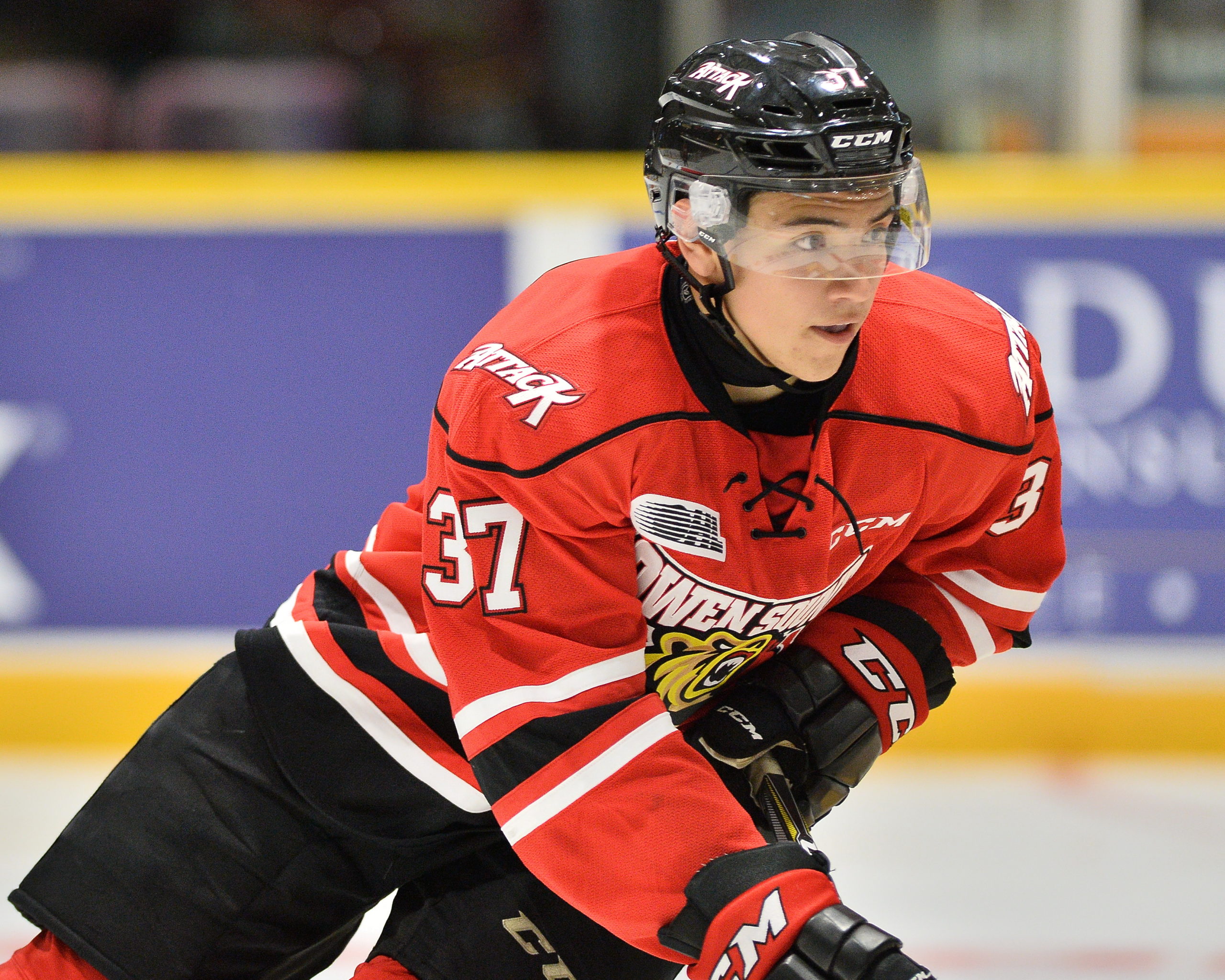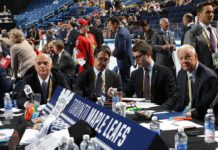Nick Suzuki is the leading scorer among the Ontario Hockey League first-year draft eligibles available in the 2017 NHL Draft.
With 45 goals and 96 points in 65 games, Nick Suzuki finished fifth in the OHL in points and fourth in the league in goals, and first in both categories among first-year draft eligibles. He also set a new Owen Sound Attack record for plus/minus in a single season at +51.
The former 14th overall pick in the 2015 priority draft was relied on in all situations in 2016-17, finishing second in the OHL in shorthanded goals with five and tied for fifth with 14 power play goals (the same number as 65-goal scorer and league MVP Alex DeBrincat).
Despite being consistently ranked behind consensus top-10 pick and fellow OHL forward Owen Tippett, Suzuki’s numbers rank superior: He scored at a rate of 1.48 points per game to Tippett’s 1.25, including 1.17 primary points per game compared to Tippett’s 1.03.
A little undersized, Suzuki stands 5’11 and weighs 183 pounds but he makes good use of what he has when protecting the puck and establishing body position in one-on-one battles. His skating is also a strong suit, at least at the OHL level. He’ll beat most defenders in a straight line and is able to compete along the boards with his quickness and agility. Board battles likely won’t be something he’ll dominate when he turns pro, but he competes well with others at the junior level.
Watching Suzuki, while he considers himself more of a playmaker, his shot is a standout asset. He is fantastic at finding holes and using his powerful shot to score from distance. Off the rush, he likes to cut to the middle and fire off a big wrist shot. It shows in the numbers: Suzuki led draft-eligible players in outside-the-slot goals and was fourth among all OHL players. NHL goalies get beat from far out much less than OHL ones do, but if there’s a player that can bring his hard and accurate shot into play at the pro level, it’s Suzuki.
Nick Suzuki Scouting Report
From Dobber Hockey’s Peter Harling:
“Nick Suzuki is an undersized dynamic offensive player who uses his speed and playmaking ability to impact the game. While slightly undersized he is not shy to play physically and go to the net or dig for pucks in the corner. Suzuki thinks the game fast and has the hands and feet to match which makes him a projectable NHL player. Suzuki has a motor that won’t quit on plays and he is a reliable back checker as well, making him an effective two-way player.”
I spoke with Nick Suzuki’s head coach Ryan McGill to discuss Nick’s skill set, role and projection at the next level.
(interview continued below)
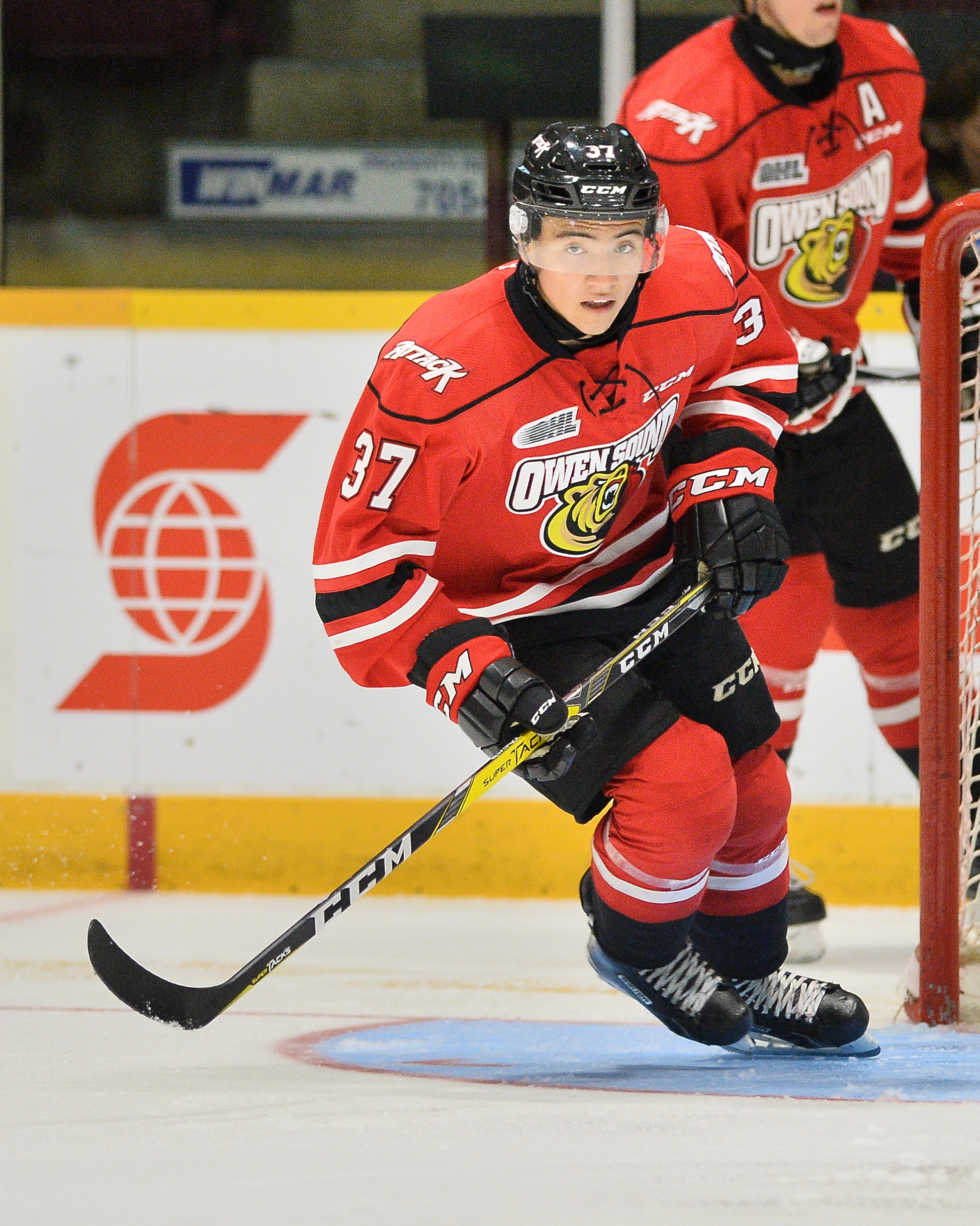
Interview: Ryan McGill on Nick Suzuki
What did your scouts think of Nick Suzuki when you drafted him 14th overall in 2015?
McGill: Well, our general manager Dale DeGray absolutely raved about him. At the time, I didn’t know the kids very well because that was going to be my first year coaching in Owen Sound. All [DeGray] said coming into training camp was that he was a smart player and obviously a first round pick. He thought he was lucky to get him at that number. For me, right from training camp until today, all he did was get better every day. Just a really, really special player that, at 16 years old, learned a lot about the league and played very well. I think he translated last year into this year and really dominated.
This year, he set a record for best plus/minus in Owen Sound’s team history. Do you put much stock into that, or is it more situational?
McGill: He played in every situation. We gave up eleven short-handed goals, and we had the #1 power-play, so I put a little stock into the plus-minus because he plays in every situation. He scores a bunch of short-handed goals. Bottom line is, he’s a reliable player. He’s a guy that you look down the bench at and you know he’s your first choice to put on the ice whether you’re up a goal or down a goal.
How crucial was he to your lethal powerplay (1st in the OHL, 28.4%) and what kind of role did he play there?
McGill: He was very crucial. He was a guy that wasn’t our quarterback because I believe your powerplay has to have a quarterback on the back-end, but he was a very instrumental puck distributor to everybody on the powerplay, with a great shot. He was a complete threat because you didn’t know whether he was going to pass the puck or if he was going to score coming off of the half wall. So, he was a really good threat for us because of those two things.
When watching him, there are quite a few instances where he’s finding holes from outside the slot area. If you compare his shot locations to someone like Owen Tippett, his average shot comes from further out. He also led OHL forwards in goals from outside the circles. Do you think he has a knack for scoring from distance?
McGill: I think that just goes to show you that his hockey sense is elite because when you’ve got guys that are only scoring goals from 5-10 feet, and you’ve got guys that are making plays from further out and scoring from further out, that shows that they’ve got hockey sense. It’s something that’s really important for NHL guys.
Do you think it could make it more difficult for him at he next level because there are so many goals scored from inside the slot area?
McGill: I think if you put Nick Suzuki with elite players, he’s going to be highly successful. He’s going to be one of those guys that is unassuming. When put with star NHL players in training camp, I think he’ll be highly successful. He won’t be intimidated. I think he’ll just take his game to another level.
How do you evaluate his character, his commitment to the game, and his acceptance of feedback?
McGill: A+, A+, A+. There’s not a lot of flaws in this kid. From the time he comes to the rink to the time he leaves, he’s a great teammate. He’s an absolute coach’s dream when it comes to commitment to detail, practice habits and leadership ability.
He seems to be a really patient and dangerous player off the rush, cutting to the middle a lot and scoring from outside the circles. How do you rate his ability off the rush versus his ability with sustained pressure in the offensive zone?
McGill: I think they’re both really good. He has the ability to read the situation, whether he’s playing wing or centre, and he has the ability to distribute the puck well. The other thing he does is play really well in traffic. I’ve never seen him get knocked over in traffic. He always has the ability to protect the puck and take things to the net.
Is that a testament to his strength? He can be viewed as a small but he seems strong on his skates.
McGill: He’s a very sneaky strong player. He’s unassuming, is what he is.
How would you rate his playoff performance?
McGill: It was excellent. This is how I’d rate him: Against Erie, he’s 17 years old and playing against 19 and 20-year-olds with four years of experience. He matched up great against those guys. With only two years of experience under his belt and playing against guys with four years of experience — NHL draft picks, players that had been to the conference final four years in a row — he was dynamite.
Considering his ability carrying the puck as well as his defensive ability, do you see him at wing or centre at the pro level?
McGill: I see him being a very versatile player. He can play both, but I think his best position to make people better around him is centre ice.
He’s called himself more of a playmaker than a shooter. Do you think that’s where his strengths lie?
McGill: I think he’s a modest individual. He’s both. He had 45 goals, so he can do the other for sure. I think he thinks of himself more as a playmaker, and he says that because he’s very unselfish.
Where was his usual deployment? How comfortable did you feel giving him big PK time and difficult matchups at 5on5?
McGill: Very, because it was the only way he was going to get better. He thrived on those situations. I can tell you right now, when you look down the bench, he’s the player you’re putting over the boards no matter what his age was.
How far away do you think he is from pro size/strength?
McGill: Like any kid, they all need to mature and grow. I don’t think he’s done growing. If I were to ask if he was even shaving by now, he’d probably say no. He needs to grow to be impactful at the NHL level. I could definitely see him playing in a couple of years. I think the sky’s the limit for this kid. Once he’s drafted, I think he’s going to understand the development side of it. I believe he’s two years away from playing in the NHL — maybe one — but I don’t see him playing this year just for the simple fact that, while he’s a good player, his development curve needs to continue on an upward trend. The best place for him is to be highly successful in the OHL.
If you see him as a centre at the pro level, how do you rate his overall defensive game and his smarts in that department?
McGill: That’s why I put him at centre. He’s highly intelligent and he puts himself on the right side of the puck in the defensive zone. He understands and recognizes danger really quickly. So, he’s an A+ for me defensively. He’s learned a lot in two years. He picks things up really quickly, and that’s why I rate him that way.



